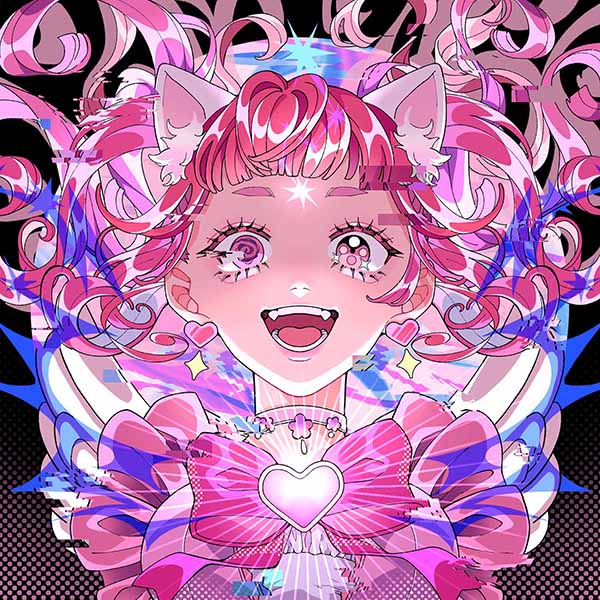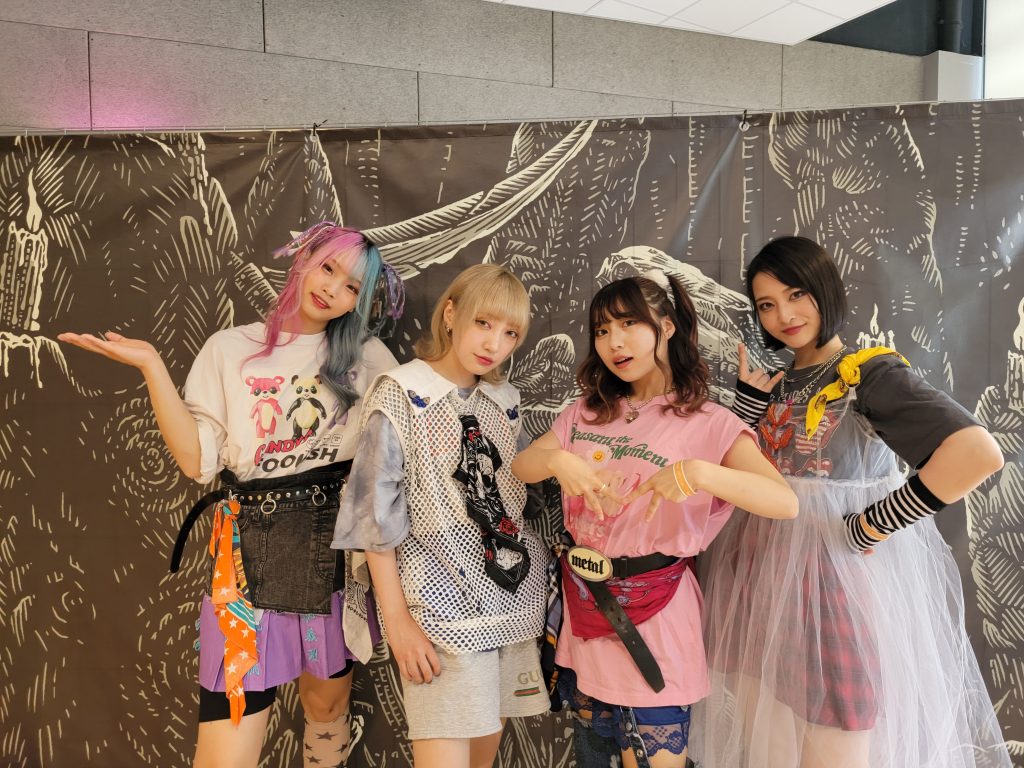
HANABIE.
Girls metal band formed in 2015. Consists of four members Yukina (vo), Matsuri (gt. & vo), Hettsu (ba & cho), and Chika (dr). Their intense metal rock sound, lyrics and visuals consisting of Japanese subculture and values, have attracted the attention of fans. Middle and high school classmates Yukina, Matsuri, and Hettsu started as a four-piece band, bringing on Chika as the new drummer in May of 2023. In July of the same year, they made their major label debut with Sony Music Labels Epic Records Japan, releasing their first album, Reborn Superstar! They embarked on their first solo domestic tour, secured slots at music festivals, and even toured internationally. They released their new single “O・TA・KU Lovely Densetsu” on January 19th, 2024.
https://hanabie.jp
X:@HA_NA_BIE_
Instagram:@ha_na_bie_
Threads:@ha_na_bie_
YouTube:@HANABIE_official
While there are many Japanese bands that have made it to the world stage, the common factor among ones that succeed globally may be that they all exude “Japaneseness”. There is a Japanese girls band that has established a new genre called, “Harajuku core” gaining enthusiastic support from metal fans mostly from the West. The band consists of four members: Yukina (vox), Matsuri (gt & vox), Hettsu (ba & BGVs), and Chika (dr). They call themselves HANABIE.
We interviewed Yukina and Matsuri from HANABIE., a band that’s been flying sky high. In part one, they shared insights on the formation of the band, the venues they performed in high school, and how they established their performance style. In part two, they shared stories of their international tour and their thoughts behind their new song, “O・TA・KU Lovely Densetsu”, and their plans for the future.
International Fans Coined “HARAJUKU CORE”
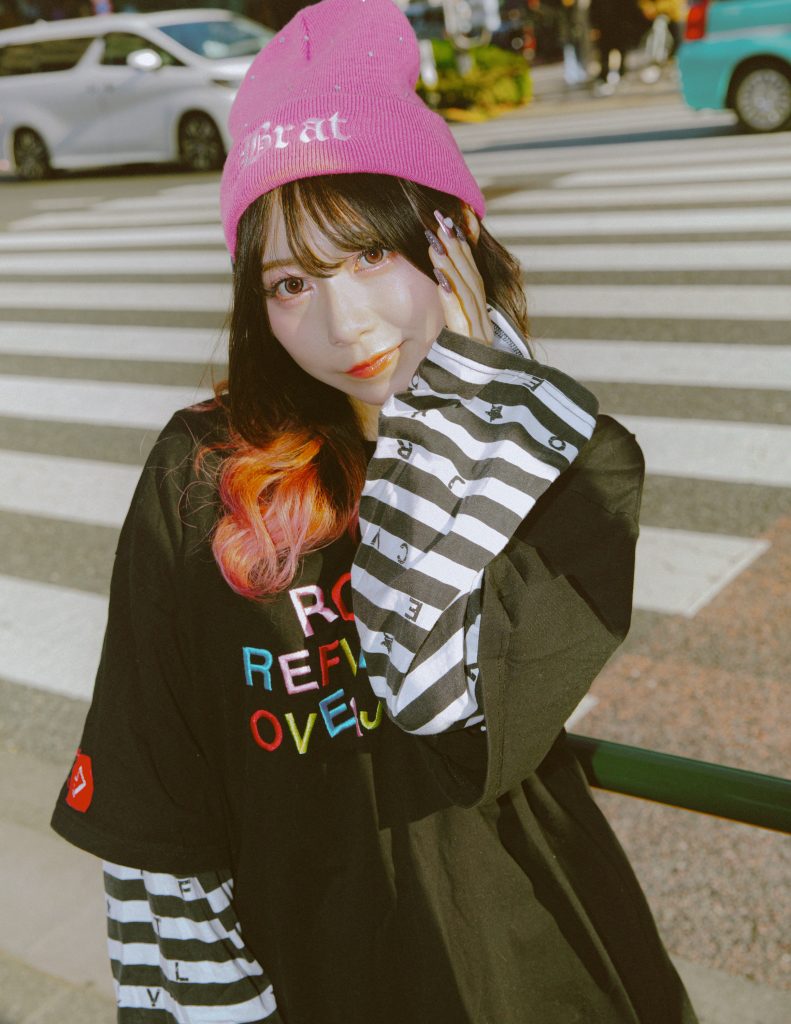
– International tours are now common for HANABIE., but were you always interested in doing shows abroad?
Yukina: No, it never crossed our minds.
Matsuri: More like we didn’t have the capacity to think that far. So even this time around, we’re like, “wow, we can go?!” (laughs). Like, “people abroad actually like our music?”
Yukina: It’s unbelievable also because our lyrics are all in Japanese. Even during this international tour, everyone was singing along to our lyrics.
Matsuri: And everyone’s good at it (laughs).
– It’s only been about a year since you’ve been able to do this.
Yukina: That’s true. During the COVID pandemic when things were still shut down, the comment section for our song “WE LOVE SWEETS” was filled with English comments. Since then, we always thought, “We’d love to go abroad, but we don’t know how”.
Matsuri: I think the “WE LOVE SWEETS” era was when we first started charting abroad, too. People from countries we couldn’t even pinpoint on a map were listening to our music.
– I heard your foreign fans were the ones who first called your music “HARAJUKU CORE”.
Matsuri: Our listeners were like, “This is a new genre! It’s HARAJUKU CORE!” in our comments. We thought it was perfect, so we kept using it in different scenarios (laughs).
Yukina: HANABIE. is a hard band to explain to people, so when we saw those comments, we were like, “That’s it!”
Matsuri: We were. Because everything falls under “metal” abroad, we thought “HARAJUKU CORE” was the perfect way to describe our sound.
– Did you feel uncomfortable with the term “metal” being used to describe your music back then?
Matsuri: No, I think in our case, calling our music “metal” is quite misleading (laughs). People are more inclined to be interested if they just understood we were doing something new. I’d be happy if they could see this as a new style of metal. So it’s not like we didn’t like being categorized as “metal”, we just want people to understand that we’re doing something chaotic within that.
– From there, after experiencing ups and downs, you had your major label debut and booked your first solo show and Tokyo/Nagoya/Osaka tour.
Yukina: We kept on missing our chance to do our solo show. We wanted it to have such an impact that we missed our opportunity and couldn’t get to it until last year.
Matsuri: We waited too long to do our solo show. We kept being like, “We need to do our solo show at the perfect time!” and kept extending it. We waited so long that we eventually got signed by a major label. We thought the appropriate time was our eighth anniversary.
Show-Intensive International Tour
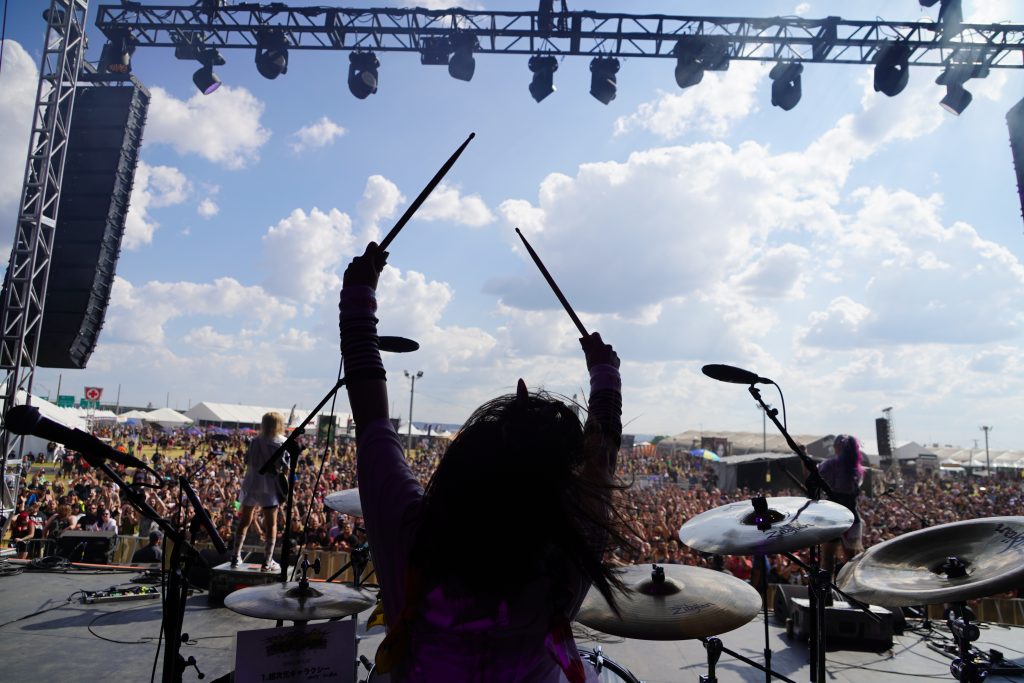
– You then suddenly had to go on a large-scale international tour, with no time to celebrate your first solo show or your major label debut.
Yukina: In retrospect, it’s crazy.
Matsuri: Truly! Everyone made us feel like they were waiting for us. Everyone was so warm. Looking back, the shows felt very strange. We were performing in countries we had never been to before. It was like, “wow, we’re really doing this”.
Yukina: Now that I’m back in Japan and can reflect back on it, I’ve started to realize how incredible an experience it was. Before going, I was quite apprehensive. I was even studying English, and found myself struggling to think about how I would be able to express myself to our fans and staff. But once I was there playing the shows, I realized there are things that don’t need to be communicated with words.
– Yukina, you were even taking English classes.
Yukina: Yes I was, and crying while doing it (laughs).
– Did it help?
Yukina: I really want to say it did (laughs), but I realized passion is more important than words.
– So real-life interactions were more important in the end.
Yukina: Of course, if we were able to speak English fluently, I’m sure our world would expand and it would enable us to play different types of shows.
Matsuri: It was easier to communicate than I thought. Even during rehearsals or in everyday conversations, everyone was willing to try to grasp what I was trying to convey. I found people from every country to be quite warm.
– That being said, I’m sure the rehearsal process is quite intense. Isn’t it important to have a mutual understanding of what’s going on?
Matsuri: That’s true. That’s why we utilized words we knew and tried to communicate through gestures, like “this is where we want to cut the sound”. They understood quite a lot, right?
Yukina: Yeah. In Europe, we got a PA who lives there to travel with us on tour. They were really stoked about it.
Matsuri: They really listened to our songs in great detail. During rehearsals, the PA would ask if we could play a specific part of the song again so they can adjust it. Because they were so passionate, we were able to get a cohesive sound by the fourth show. I’m so glad we met such a great PA in Europe.
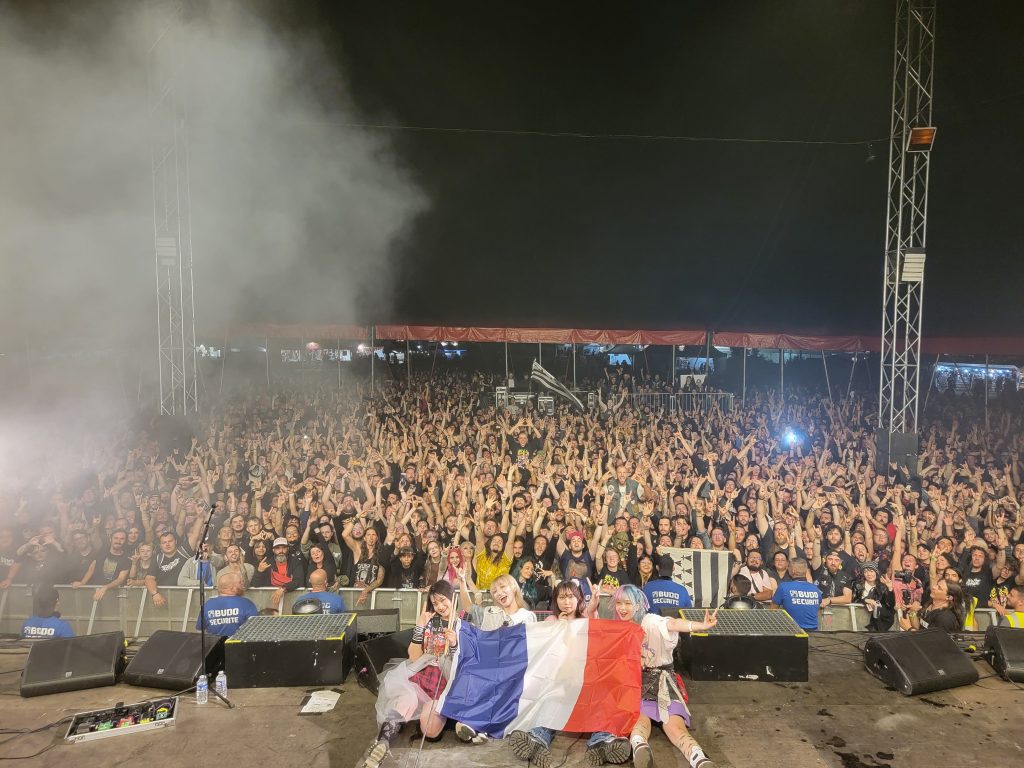
– How was your American tour?
Matsuri: We had more show dates in the U.S. than in Europe.
Yukina: Our daily schedule was sleep, wake up, rehearse, play a show, repeat.
Matsuri: We had to make sure which city we were in, because it got so confusing. We also did something we had never done as a band: play six shows in a row.
– And you did it abroad.
Matsuri: On top of that, each venue was so hot. Even if the air conditioner was on, it would start feeling like a sauna each time the show started.
Yukina: That made us become more resistant to the heat (laughs).
Matsuri: I’m confident that we can play in the hottest circumstances (laughs).
Yukina: Sometimes there was so little air circulating that I thought I was going to pass out.
Matsuri: In a sense, I guess we can now say we won’t get flustered if anything goes wrong during a show.
– Has your experience abroad affected your songwriting?
Matsuri: Absolutely. Our major label debut album, Reborn Superstar!, is our idea of a concept album. In it, we added songs with more of our glittery, upbeat sound. That is one of HANABIE.’s core pillars. We’d like to have two or three more pillars, too. We had a bunch of ideas come up in the process of being abroad, too, like “it might be fun to mix this type of genre into our music”, or “we have too many fast tempo songs, so let’s slow it down”, or, “let’s try changing the tuning”, taking notes everytime we thought of something.
Yukina: We talked about a lot of this as a band.
Matsuri: For the tour we did, I communicated what I wanted to do with the band, got the rest of the band to do the same, and summarized what songs we wanted to include in the next album among the four of us. We’ll use that as a template to start production on our next record.
– You gathered some powerful tools during your time abroad. Now you can use those newly acquired tools to create something new.
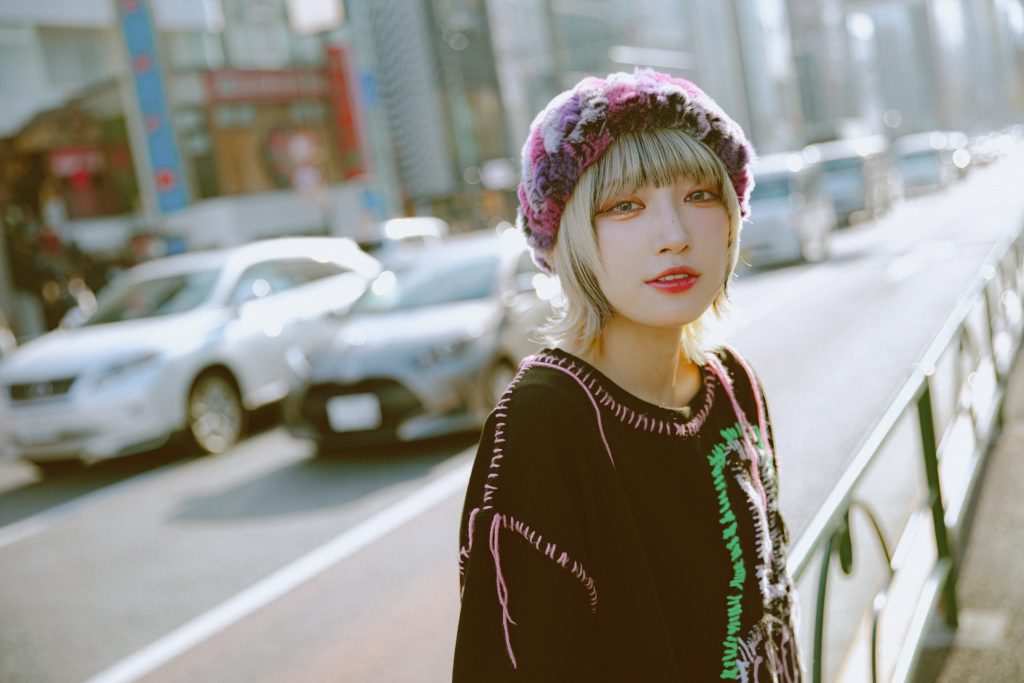
Matsuri: There are some songs we wrote at our hotels during tour, which may bring a different flavor to our sound.
Yukina: We were also heavily influenced by the bands that we played with. In the U.S., we played with Dropout Kings and Fox Lake, as well as with Galactic Empire. It was our first time playing with the same bands all tour, so that was really fun.
Matsuri: It was so fun, wasn’t it.
Yukina: The more we were together, the more we vibed. We were so sad by the end.
Matsuri: We were so sad, but they were so cool because they told us that there’s no way this would be our last time seeing each other, and that we’d meet again soon.
Yukina: I was sobbing (laughs). We were able to get through the tour because of them.
Matsuri: After we went our separate ways, I saw Yukina sobbing while listening to super hardcore music next to me, and thought, “how surreal” (laughs).
Yukina: We got fired up every time we saw the other bands’ shows.
Matsuri: Every band did what they could to connect the whole show to us, as we were last to play. Their efforts came across. By the end, it really moved me.
Yukina: I’d love to bring them to Japan one day.
Matsuri: We definitely want to do that. I think they would be a hit among Japanese kids and band-lovers.
HANABIE. Finally Boldly Embraces “Otaku”.
– Was the new song you’re releasing, “O・TA・KU Lovely Densetsu”, written while on tour?
Matsuri: It was a song we wrote right before we went abroad. We wanted this to be our last super upbeat song for a while. We did everything we wanted to do with this song, more than ever. We added AI vocals, which was something new for us, to give a more 2.5 dimensional sound.
– Are the English parts AI? I didn’t notice.
Matsuri: Yes, that’s the part. We had AI speak, and then combined that voice with Yukina’s real voice to give it a brand new, 2.5-dimensional sound.
Yukina: Personally, I didn’t know that Japanese culture was so popular. I knew that as a fact, but experiencing it and having people approach me and say, “I love this Japanese anime”, or “I like Pokemon”, made me really happy. That’s why we chose this theme for this song.
– You had some references to otaku culture in your other songs, but this time it’s explicit.
Matsuri: Yeah, the lyrics are really only about otaku.
– I hear some Sailor Moon in there, too.
Matsuri: All of us like that kind of anime. We tried incorporating the sparkly vibes of our favorite animes.
Yukina: I think this is a song that can only be executed by HANABIE., and it’s something different from what we’ve done before.
– It’s quite rare to find a band that openly embraces otaku culture, which is also what differentiates HANABIE. from other bands. Other bands may have members who secretly like anime, but not many can express that love so directly in their music. But HANABIE. is different. You have a punk spirit that enables you to show your whole selves. That’s why “O・TA・KU Lovely Densetsu” is so refreshing.
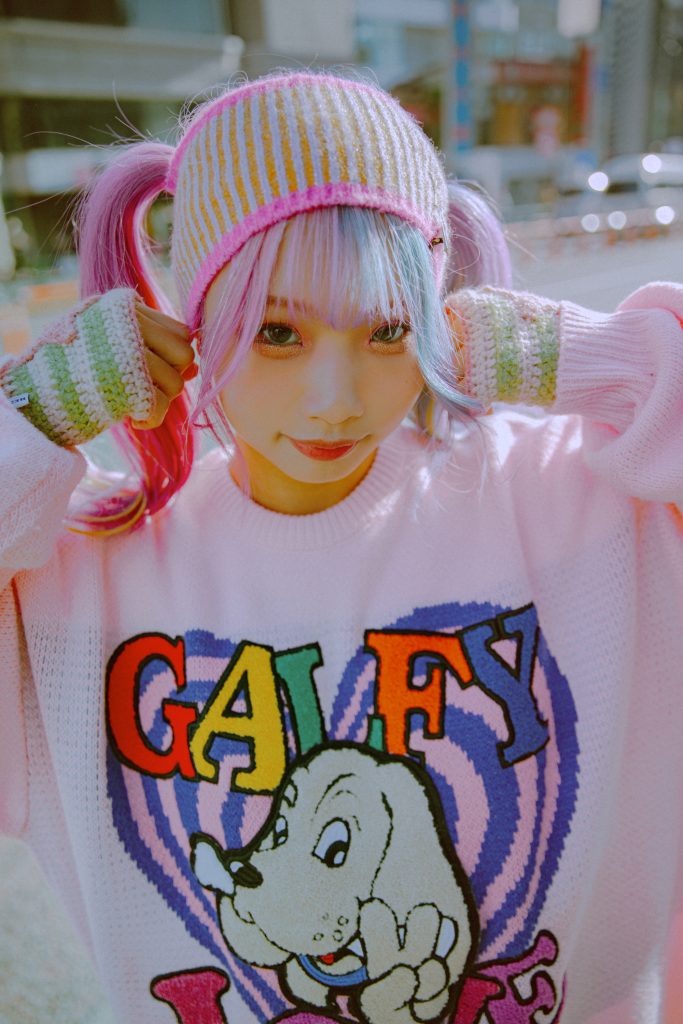
Yukina: It’s true that it’s refreshing (laughs). We want to be straightforward and as true to ourselves as possible.
Matsuri: That’s right. We’re like, “We can confidently say we like otaku because we also identify as otaku!” (laughs).
Yukina: We also want to tell people, “Otaku like these exist in the world, we’ve seen them firsthand!” (laughs).
Matsuri: I think that’s what’s fun about it. If an otaku listens, they’ll understand, but a non-otaku can also listen and be like, “otaku are kind of cool”.
– I didn’t realize that was the message.
Matsuri: I think otaku culture has been embraced by many people now. We live in a world where everyone, including the beautiful woman sitting next to you on the train, is probably an otaku. We want everyone to know that we live in a society where we can proudly admit to being an otaku!
Yukina: The word for “suteki” in English is “lovely”. So, we wanted people to think that “being an otaku is lovely”.
Matsuri: As otaku ourselves, we thought we needed to address that being one is nothing to be ashamed of (laughs).
– So, what kind of year would you like 2024 to be?
Yukina: There was a lot to absorb from all over the world in 2023. I want to take advantage of that and fully utilize it, whether that’s for shows or songs. I also want to do a proper Japan tour, and we have some international festivals coming up. We’re excited for what we have in store.
Matsuri: In terms of music, we made a lot of lively, sparkly songs in 2023. In 2024, we want to show another side of HANABIE. Hopefully, you’ll get to see some of that .
– Let me ask one last question. Until now, it was long believed that Japanese bands should tour domestically before venturing into the global market, or that English songs would need to be released in order to target international audiences. But I believe that HANABIE. has shattered all these “conventional” beliefs. From your perspective, what advice would you give to Japanese bands that are looking to go global, considering new, unique approaches to expanding a band’s reach that are specific to today?
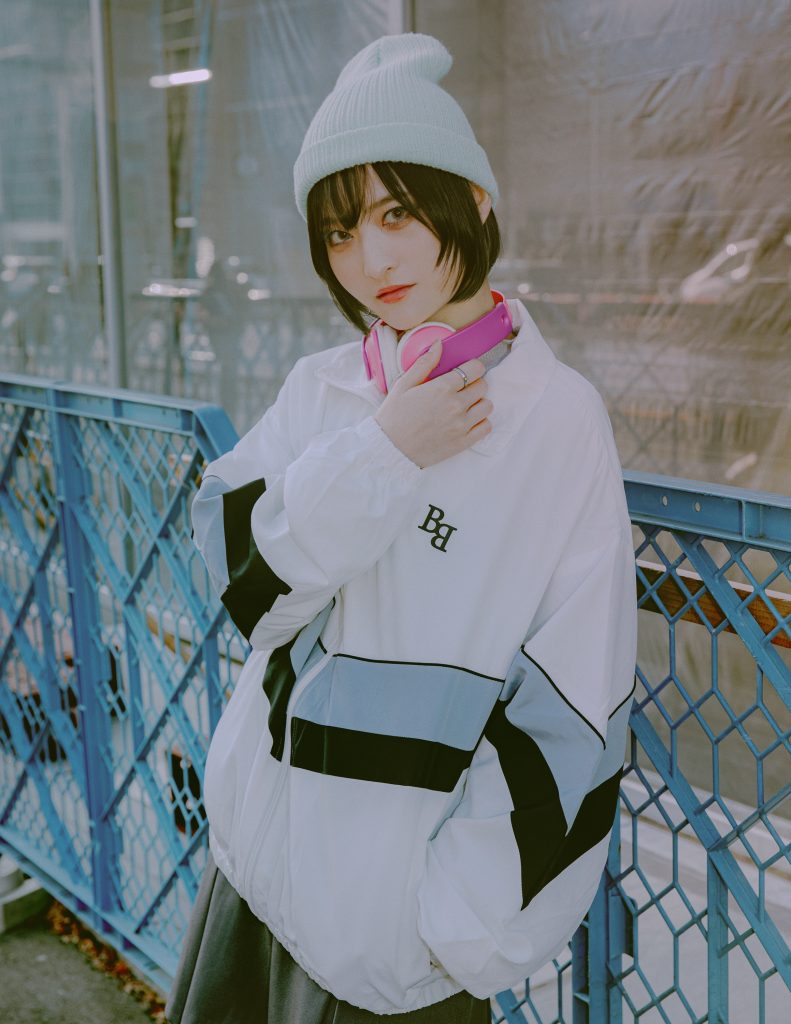
Yukina: There may be restrictions depending on the country, but I realized through YouTube and social media just how much reach our music has. Because of these different platforms, people across the world sang along to songs that are in Japanese, and we saw passionate fans from countries we had never even visited. So I do believe it’s essential not only to focus on music but also to utilize social media in a visually appealing way.
Matsuri: When we went on tour abroad, we had so many happy fans who, regardless of the language barrier in the music, were having a great time. It was then that I thought we could’ve gone abroad even earlier. Looking back, I think we were unnecessarily anxious. Setting up shows abroad is not simple. It requires different costs, like transportation, so I’m not saying this lightly. But if a band has a desire to go abroad, they should.
Even if your band is unknown abroad, people usually casually walk into venues in places like Europe and the U.S. Even in taxis, the drivers often play their own music, not just mainstream stuff. A lot of the time, they play more unknown, cool songs, just like any other everyday music listener, which there are a lot of. Ultimately, I think it’s a good idea to actively reach out and go find your own audience.
Photography Hamanaka Yoshitake
Translation Mimiko Goldstein
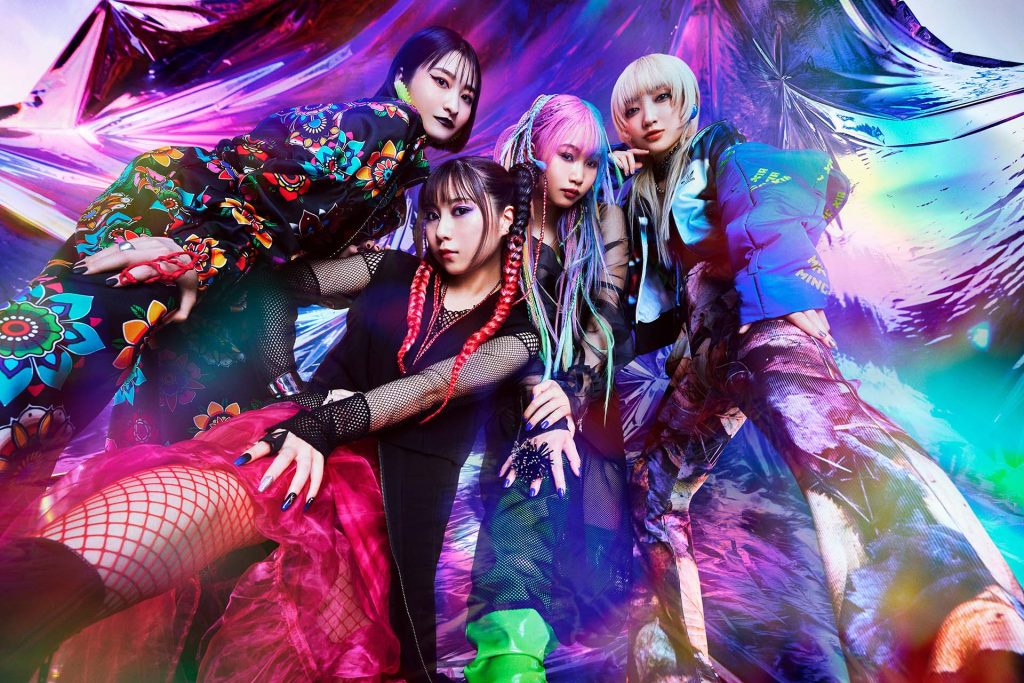
■HANABIE.”O・TA・KU Lovely Densetsu” now streaming
■HANABIE. Major label debut album Reborn Superstar! official website

